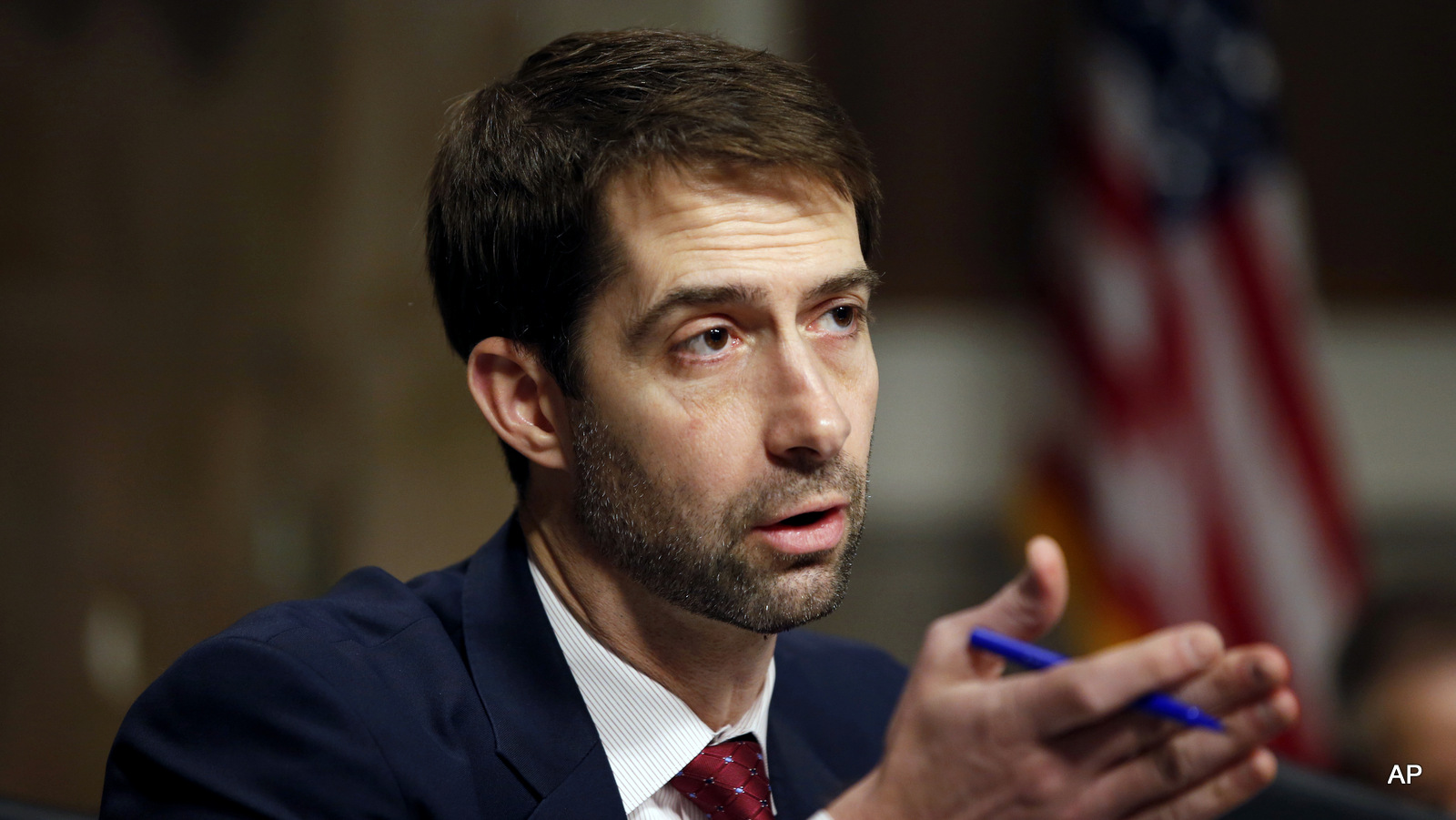
Sen. Tom Cotton, R-Ark. speaks on Capitol Hill in Washington. )
Sen. Tom Cotton on Thursday slammed his colleagues’ efforts to pass sweeping criminal justice reforms, saying the United States is actually suffering from an “under-incarceration problem.”
Cotton, who has been an outspoken critic of the bill in Congress that would reduce mandatory minimum sentences, smacked down what he called “baseless” arguments that there are too many offenders locked up for relatively small crimes, that incarceration is too costly, or that “we should show more empathy toward those caught up in the criminal-justice system.”
“Take a look at the facts. First, the claim that too many criminals are being jailed, that there is over-incarceration, ignores an unfortunate fact: for the vast majority of crimes, a perpetrator is never identified or arrested, let alone prosecuted, convicted, and jailed,” Cotton said during a speech at The Hudson Institute, according to his prepared remarks. “Law enforcement is able to arrest or identify a likely perpetrator for only 19 percent of property crimes and 47 percent of violent crimes. If anything, we have an under-incarceration problem.”
Expanding upon his remarks during a question-and-answer session, Cotton said releasing felons under reduced sentences serves only to destabilize the communities in which they are released.
“I saw this in Baghdad. We’ve seen it again in Afghanistan,” recalled Cotton, who served in the Army during both wars. “Security has to come first, whether you’re in a war zone or whether you’re in the United States of America.”Those advocating for criminal justice reform through such measures appear to have forgotten the high-crime days of the 1980s, Cotton remarked, noting that the federal prison population is declining.
As of Thursday, there are more than 195,000 federal inmates, according to the Federal Bureau of Prisons. That number represents a decrease from 214,000 in 2014, Cotton said.
“I believe the criminal-leniency bill in the Senate is dead in this year’s Congress. And it should remain so if future versions allow for the release of violent felons from prison,” he went on to say. “I will, though, happily work with my colleagues on true criminal-justice reform—to ensure prisons aren’t anarchic jungles that endanger both inmates and corrections officers, to promote rehabilitation and reintegration for those who seek it, and to stop the over-criminalization of private conduct under federal law. But I will continue to oppose any effort to give leniency to dangerous felons who prey on our communities.”
On the effort to “Ban the Box,” which Cotton called a “praiseworthy” but ultimately misguided undertaking, he also called it inappropriate for the government to dictate hiring decisions.
With respect to restoring felons’ voting rights, Cotton said that decision should be left to the individual states. Just last month, Virginia’s Democratic Gov. Terry McAuliffe signed an executive order granting voting rights to felons who have completed their sentences, reversing decades of state law predating the Civil War.
“Now, it’s true there were felon-disenfranchisement laws that deliberately targeted blacks after Reconstruction. Each of those laws has been justly struck down by the Supreme Court or amended to rid them of their original racial animus,” Cotton said. ” But that sad chapter in our history doesn’t undermine the logic behind modern felon disenfranchisement laws. Should murderers, rapists, and others whose behavior fall so far outside the norms of our society be immediately accommodated? Given recidivism rates, should we create an automatic pro-crime constituency in our society? Should felons be trusted to elect legislators who make the law, prosecutors who enforce it, and judges who apply it?”
Cotton then turned to a discussion of “policing techniques and the growing assault on law enforcement.” Investigations into use of force are necessary, Cotton said, invoking his past military service.
“But what should not and cannot occur is a rush to demonize law enforcement whenever force is used,” he continued. “In the absence of facts and hard data, we’re vulnerable to heart-wrenching images, to our own biases, and to cheap demagoguery.”
Referencing what has been called the “Ferguson effect,” as FBI Director James Comey termed a theory that the viral nature of videos showing isolated incidents of police force could be behind a rise in crime, Cotton remarked that a “chilling effect was nearly unavoidable.”
“Now let me make something clear: black lives do matter. The lives being lost to violence in America’s cities are predominantly those of young black men, with devastating consequences for their families and their communities,” he said. :But the police aren’t the culprits. In nearly every case, the blood is on the hands of criminals, drug dealers, and gang members.”
Recalling former President Bill Clinton’s run-in with protesters in which he told them, “You are defending the people who killed the lives you say matter,” Cotton remarked that “for once,” the fellow Arkansan “was right. ”
“And it’s the police who are trying to protect those lives and prevent those murders,” he said. “We shouldn’t stigmatize them; we should thank them.”
The post Sen. Tom Cotton Insists The America Has ‘Under-Incarceration Problem’ appeared first on MintPress News.